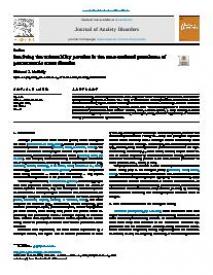Resolving the vulnerability paradox in the cross-national prevalence of posttraumatic stress disorder
Socioeconomically disadvantaged individuals are at heightened risk for developing posttraumatic stress disorder (PTSD) following exposure to trauma. Yet a study of cross-national lifetime prevalence rates of PTSD revealed that countries scoring high on an index reflecting cultural and socioeconomic disadvantage exhibited lower rates of PTSD in response to trauma, evincing what the authors called “a vulnerability paradox in the cross-national prevalence of post-traumatic stress disorder” Dückers, Alisic, & Brewin (2016a, p. 300). Drawing on classic studies in sociology and political science concerning the ecological fallacy, the author suggests ways to resolve the striking paradox discovered by Dückers et al.
Geachte bezoeker,
De informatie die u nu opvraagt, kan door psychotraumanet niet aan u worden getoond. Dit kan verschillende redenen hebben,
waarvan (bescherming van het) auteursrecht de meeste voorkomende is. Wanneer het mogelijk is om u door te verwijzen naar de bron
van deze informatie, dan ziet u hier onder een link naar die plek.
Als er geen link staat, kunt u contact opnemen met de bibliotheek,
die u verder op weg kan helpen.
Met vriendelijke groet,
Het psychotraumanet-team.
In: Journal of Anxiety Disorders, ISSN 0887-6185 | 54 | March | 33-35
https://doi.org/10.1016/j.janxdis.2018.01.005
Response to: Dückers, et al. (2016). A vulnerability paradox in the crossnational prevalence of post-traumatic stress disorder


